Cost of Products and Services
/Do you have a product or service that you want to sell overseas? Do you need to compare how much things cost over there? It’s essential for the price to be in line with your target audience’s income and expectations, but also provide the level of profit you want. Establishing the average cost of a product in the market can help with this pricing metric. Here’s a tool by Deutsche Bank, that has the price of a cappuccino to the cost of a pair of Levi’s in 50 cities.


